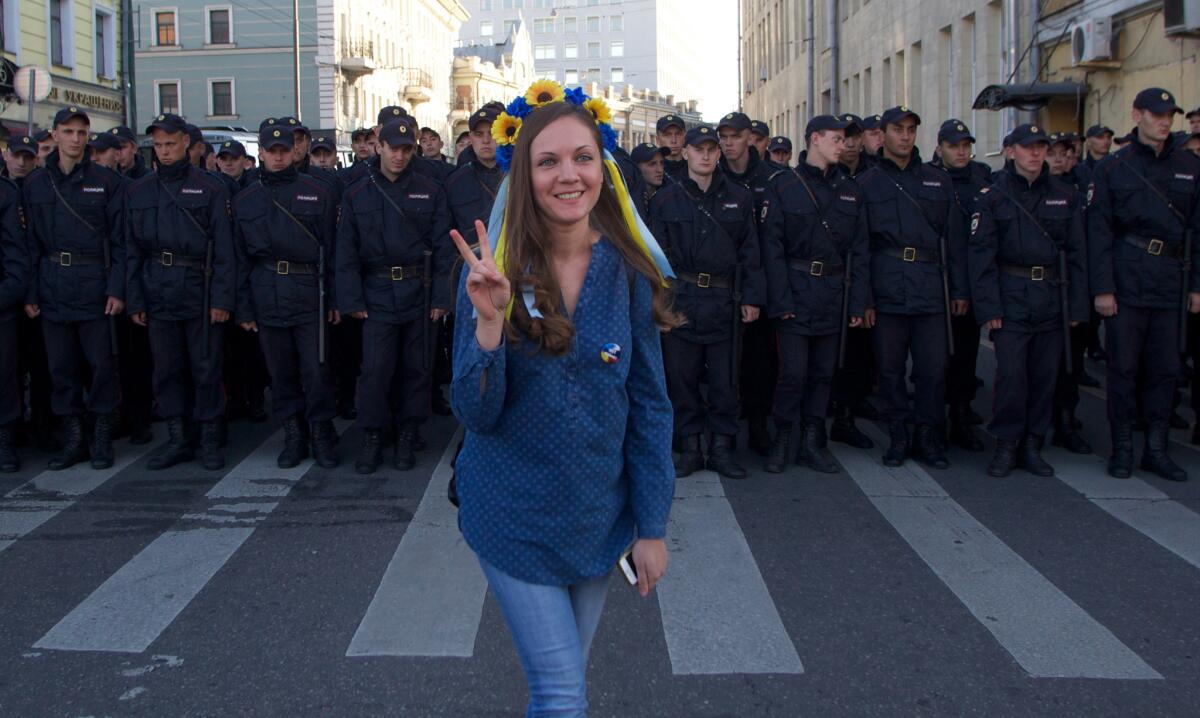Thousands march in Moscow to protest Russia’s Ukraine policies

- Share via
Reporting from Moscow — Thousands of people marched peacefully through the streets of Moscow on Sunday to protest against the conflict in eastern Ukraine and the Kremlin’s support for pro-Russia separatists there.
Under the close watch of riot police, demonstrators carried banners saying “No to War,” “Hands off Ukraine,” and “Russia will be Free.” Many waved the blue-and-yellow flag of Ukraine.
------------
FOR THE RECORD
An earlier version of this post said polls indicate that most people believe the Kremlin is on the right track with its policy in Ukraine. It should have said most people believe the Kremlin’s policy in Ukraine is on the right track.
------------
Ukraine and its Western allies accuse Russia of arming the separatists and sending troops across the border to support them. Moscow denies military involvement in the conflict, although separatist leaders say at least 3,000 Russian servicemen have joined their ranks as volunteers.
At least 3,000 people have been killed since the fighting began in April.
After weeks of negotiations, Moscow police granted Russia’s Parnas, Yabloko and Solidarity opposition parties permission to lead a march of up to 50,000 demonstrators Sunday to coincide with the United Nations’ annual day of peace.
Calling for an end to what the organizers called the Kremlin’s “irresponsible, aggressive policy” in Ukraine, it was the first large street protest in the capital since a rally in late March against Russia’s annexation of Ukraine’s Crimean peninsula.
Large numbers of police officers swarmed into central Moscow early on Sunday and sealed off the route of the planned march, which began in Pushkin Square and wound down the city’s Garden Boulevard to Prospect Sakharov, a distance of about two miles.
Although there was at least one scuffle between protesters and nationalist counter-demonstrators, the march was overwhelmingly peaceful. No arrests were reported.
As in previous opposition rallies in Moscow, estimates of the number of participants differed widely. City police said about 5,000 people joined the march Sunday while the Russian Union of Observers claimed at least 26,000 demonstrators took part.
The Ukraine crisis has boosted nationalism in Russia, where most people are overjoyed that Crimea is once again part of their country. Polls indicate that support for Russian President Vladimir Putin is at an all-time high of 87% and that most people believe the Kremlin’s policy is on the right track.
However, polls also show that most Russians are opposed to their country becoming involved in a war in Ukraine. Recent media reports detailing the secret burials of Russian soldiers reportedly killed during action in Ukraine have sent shock waves through a society that is generally averse to armed conflict.
A large group of mainly female demonstrators on Sunday carried the photographs of soldiers reportedly killed in Ukraine and banners saying, “Putin is the murderer of your children.”
Few in the crowd thought the peace march would influence the Kremlin to change course and respect Ukraine’s independence. “They still have an imperial mentality. What can you do?” said Lyudmila, a biology professor who declined to give her last name for fear of repercussions.
“Putin is a very complicated person. He won’t stop,” said one woman who declined to give even her first name. “What can we do except ask Ukraine to forgive us?”
Moscow authorities had forbidden opposition leaders to address the crowd, a tactic that deprived the march of a focal point. After an hour and a half, the demonstrators trailed off toward the subway station with police dispersing any laggards.
Artyom Kirokozov, a political scientist, came to the march with a sound system that played the Beatles’ “All You Need Is Love,” to the delight of the crowd.
“They can ban everything here, but no one can ban the Beatles,” said one onlooker.
Gorst is a special correspondent.
More to Read
Sign up for Essential California
The most important California stories and recommendations in your inbox every morning.
You may occasionally receive promotional content from the Los Angeles Times.










